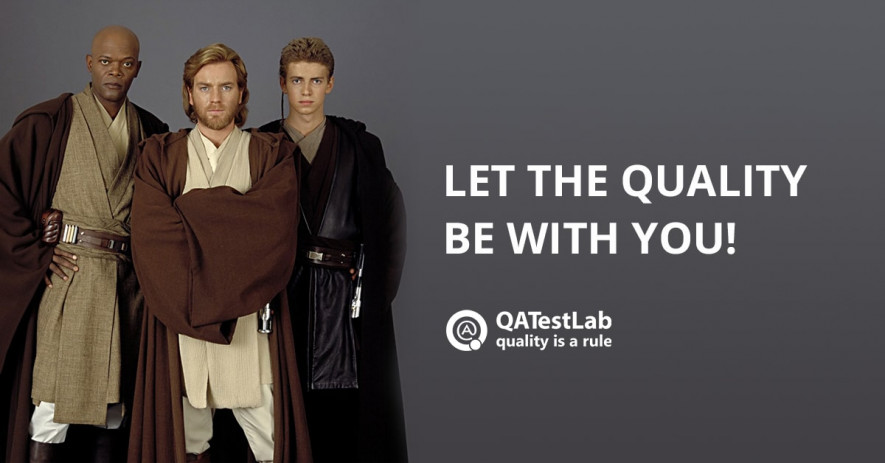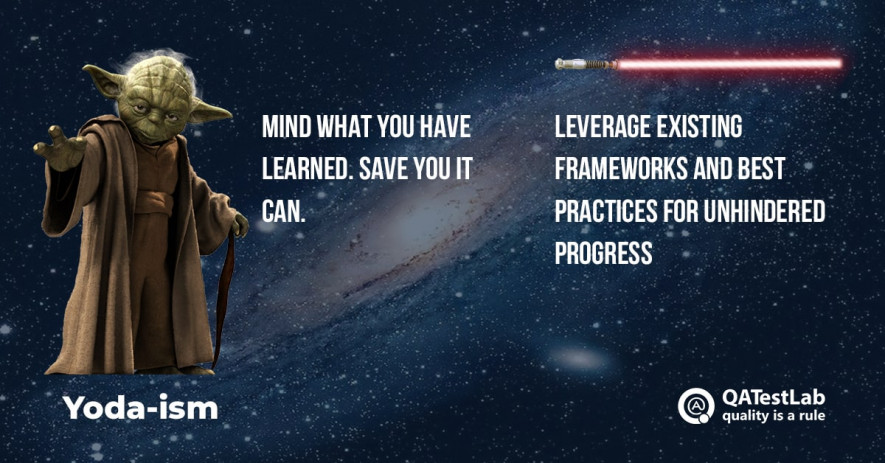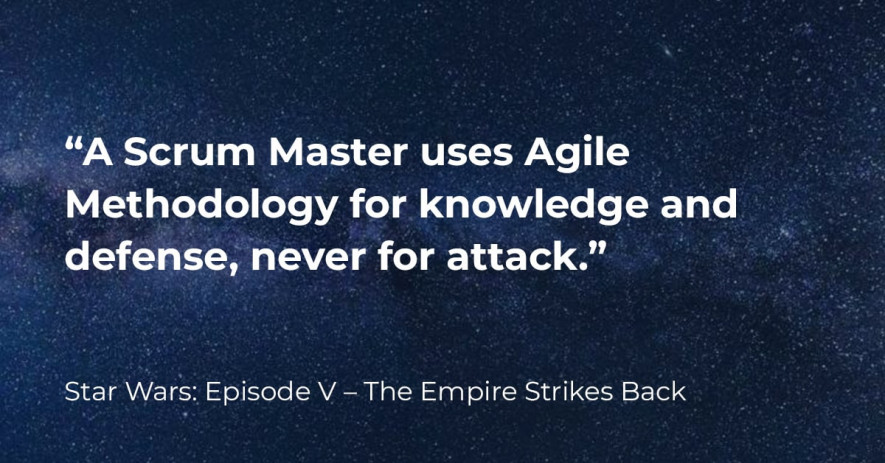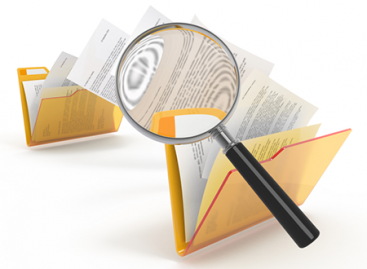- QATestLab Blog >
- QA Basics >
- The Path of QA Jedi: 10 Books Every Tester Should Read
The Path of QA Jedi: 10 Books Every Tester Should Read

Gaining knowledge on QA engineering is a challenging path only the brave can handle. But while there are lots of things to learn, read, and try in practice, is there a way to do all these tasks faster? Today, we decided to point out the books that could potentially accelerate the passage of this learning curve. Stop dreaming, start reading: here is a selection of must-read material on software testing to make you a QA Jedi!
Grab your coffee and a comfortable chair and dive into a new article from QATestLab.
From Zero to Hero: TOP 10 Books on Software Testing
A book is always the best mentor. If you read at least one worthy publication on software testing every month, you’ll soon have a firm grasp on the field and distinguish yourself from nearly all QA engineers around you. But the question is: how to find the books that are worth your time and effort?
From basics of QA to software development and the logic of causal links, here are the books selected by QATestLab that will turn you into a real QA Jedi:
#1 How to Break Software: A Practical Guide to Testing by James A. Whittaker (2003)
Why worth reading: If you are new to the software testing world, this book will open up doors for absolutely all test objects, approaches, and techniques for ensuring software quality.
Key things you will learn: Classic book on fundamentals, strategies, and procedures. While a college-trained tester or a person with many years of experience will find this too basic, it’s still worth thumbing through for a new idea or two.
#2 The Black Swan: The Impact of the Highly Improbable by Nassim Nicholas Taleb (2007)
Why worth reading: To have a clear understanding of “errors” and what it means to “think like a tester.”
Key things you will learn: A fun and adventurous read that at first glance may seem not directly connected with the world of QA. Focusing on taking examples from failures in financial systems, the book draws lessons that directly apply to software. It will teach you to properly analyze unexpected atypical cases of failure, and catch the right logic behind them.
#3 The Domain Testing Workbook by Cem Kaner, Douglas G. Hoffman, and Sowmya Padmanabhan (2013)
Why worth reading: What are the regular tasks QA engineers usually have? This book is the right mixture of theory and practice on the essence of this work.
Key things you will learn: It is one of the most extensive works you will ever find on specific testing techniques, approaches, and test ideas broken down by data types, risks, and inputs. It will help to create an overall map of all the needed concepts in your mind.
#4 The Art of Software Testing by Glenford J. Myers, Corey Sandler, and Tom Badgett (1979)
Why worth reading: Old but gold, this book has the ultimate goal to teach you to ensure the quality of software products in the most effective way.
Key things you will learn: Everything from web testing to security testing, compatibility testing, and test automation, this book will become a comprehensive guide on all the essential testing types. By the way, the book was updated in 2005.
#5 Agile Testing, by Lisa Crispin and Janet Gregory (2008)
Why worth reading: If you want to be among QA engineers who follow all the latest trends, this book will show you innovative approaches to work up to this date, namely the world of Agile.
Key things you will learn: How the Agile works, what is the Agile quadrant, what are the real cases of application of this methodology within a QA team. Most importantly, what are the potential challenges during Agile Transformation, the drag factors that can slow down a team, and what instruments to use? Here all theoretical and practical concepts behind this methodology are gathered.
#6 Beautiful Testing: Leading Professionals Reveal How They Improve Software by Tim Riley and Adam Goucher (2009)
Why worth reading: Another must-read for anyone who wants to grow in testing. It shares a fascinating side of QA; namely, it takes an in-depth look at how other top testers do their work.
Key things you will learn: With each chapter written by a different author(s), you can absorb a great share of real experience and knowledge on testing. For instance, you will learn everything on test processes, procedures, testing tools, and how to make the most of them in real-world environments. In other words, this book is the fount of wisdom on this topic!
#7 Advanced Software Testing, Guide to the ISTQB Advanced Certification as an Advanced Technical Test Analyst, by Rex Black (2008)
Why worth reading: Lots of practical examples and exercises described in the explanatory narrative flow.
Key things you will learn: This book does a great job of providing practical, memorable approaches to navigating the realm of test analysis, design, and execution.
#8 How Google Tests Software by James A. Whittaker, Jason A. Joseph, and Jeff Carollo (2012)
Why worth reading: Oriented more toward Senior, or Middle QA engineers, this book will show how the best of the best QA Jedi conduct their testing.
Key things you will learn: The mechanism and testing processes within the QA team in Google. Interviews with leading experts are particularly attractive. Plus, all the content is filled with professional humor, visual illustrations, and forecasts for the development of the testing industry.
#9 Don’t Make Me Think by Steve Krug (2000)
Why worth reading: The book leads us toward the mindset needed to focus, foremost, on the user’s experience and the user’s goals in accessing a web site.
Key things you will learn: This book will help deal with usability – an equally important point in testing. In an easy, humorous form, it tells us what usability is, why it is needed, and how to make the end-user happy.
#10 Software Testing a Craftsman’s Approach by Paul C. Jorgensen (2002)
Why worth reading: The last but not least book to enrich your knowledge on QA and software testing realm, both for newcomers and professionals.
Key things you will learn: The book is for those who have already comprehended the basics of QA because it covers such serious topics as code-based (structural) and specification-based (functional) testing.
Final word
The American philosopher Ralph Waldo Emerson once said:
If we encounter a man of rare intellect,
we should ask him what books he reads.
As you can see, the path to realizing the QA power of a software testing Jedi is not the easiest one. But having the right books on your shelf may be a great trick to learn everything faster. Today, we have shared the best pics of books you can read and safely pass software testing learning journey. Most importantly, after reading, you will be able to test your knowledge in practice. Good luck!
……………………………
If your products requirу testing, we are ready to hedge your team and ensure the high quality. We are participating in the life of the product, and do our work with a passion for your success. Contact us, or visit our blog to read more about QA & testing.
Let’s grow together!
Learn more from QATestLab
Related Posts:
- 11 Books Each QA Engineer Should Read
- When Bugs Tank Your Rankings: How QA Testing Drives SEO Performance
- ICE Barcelona 2026: Between Poker Wins and Talks on QA in iGaming
About Article Author
view more articles
has more than 2-year experience in blogging and copywriting, copyediting and proofreading of web content.
View More Articles









No Comments Yet!
You can be the one to start a conversation.